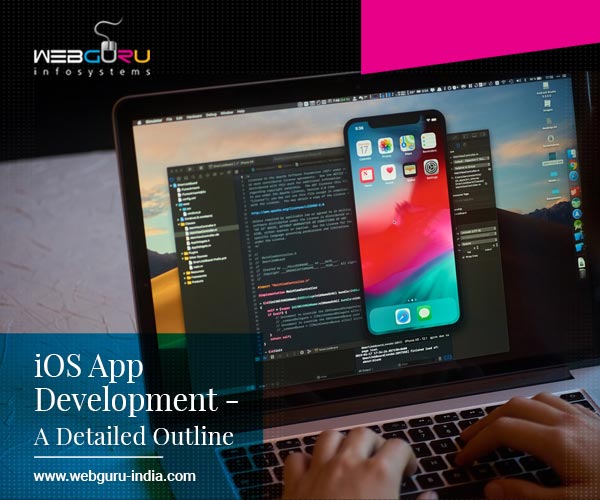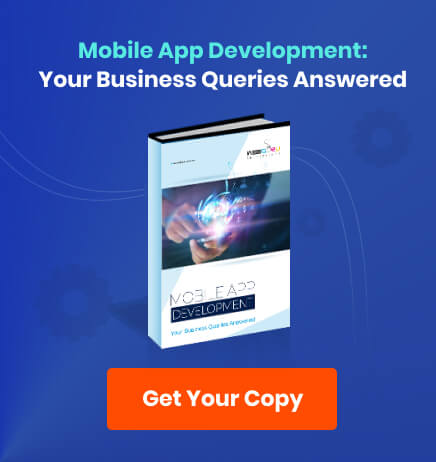Home Blog Mobile App Development iOS App Development – A Detailed Outline
iOS App Development – A Detailed Outline
- 31 May / 2021
- 3,248 views

In January 2021, Apple announces that there are about 1.65 billion Apple devices actively in use. To reach out to such a wide user base, more and more businesses are investing in iOS app development services.
If you have the same intention, this blog is just for you. We will take a closer look at various aspects of iOS app development. Let’s get started.
iOS Application Development: An Overview
iOS applications are accessible through Apple hardware including iPhone, iPod Touch, and iPad. Written in Swift or Objective-C, the software is then deployed to the App Store.
Here are the prerequisites:
- A Mac Computer with the latest version of macOS
- An active Apple developer account – it costs $99 as an annual fee
- Xcode – the Integrated Development Environment (IDE) for macOS – you can download it for free from Mac App Store
Xcode is not all about signing in and publishing a completed app. The IDE has a user interface designer, code editor, testing engine, asset catalogue, etc. to facilitate iOS app development.
iOS Programming Languages
There are two programming languages for building an iOS application:
1. Objective-C
As is clear from the name, Objective-C is based on the language-C. It is an object-oriented programming language based on passing messages to various processes. This trait makes it different from invoking a process in traditional C programming.
The major characteristics of Objective-C include:
- Object-oriented paradigm
- Expressive message syntax
- Dynamic run-time
- Automatic garbage collection
- Access to Apple technologies
2. Swift
Introduced in 2014, Swift is considered by many experts as the future of iOS app development. It uses a simpler syntax. Swift focuses more on security and shares a run time with Objective-C. Therefore, you can incorporate legacy code into the updated applications.
Some of the prime characteristics of Swift are:
- Built-in powerful error handling
- Advanced control flow with defer, guard, and other keywords
- Multiple return values and Tuples
- Fast and concise iteration over a range
Libraries and APIs
iOS has an extensive collection of resources for app development. Apple releases APIs and libraries as kits that are easy-to-use and feature-rich. You can use these iOS SDKs for seamlessly integrating an app into Apple’s existing infrastructure. There are various kits available that allow the developers to build apps leveraging the built-in features like native calendar app & camera and connect to social media.
Some of the core frameworks of iOS include CocoaTouch, UIKit, AutoLayouts, AVFoundation, CoreData, MapKit, CoreLocation etc.
And here are some of the useful iOS libraries: SnapKit, SwiftLint, Hero, RxSwift, Alamofire, etc.
Consistent Testing
According to the experts of mobile app development services, continuous testing is integral to application development. The good news is that you need not test the app on multiple devices from different manufacturers as the operating system is owned by Apple. However, you should test the app on various generations of iPhones.
Testing will help you to identify and fix issues like:
- Application crashing
- Incompatibility with devices
- Security loopholes
- Memory leaks
Here are various types of testing:

Quick Tip: Apple offers a TestFlight service for testing applications. It allows the developers to run internal testing with up to 25 members on up to 30 devices each. That way, you can collect reviews from your friends and family and make adequate modifications before releasing the app.
Publish the App
Now that you are done with development and testing, it’s time to submit the app to the App Store. You can accomplish that directly through Xcode. Bear in mind that the app review process can be lengthy and may require multiple revisions before you get approval.
Use the App Store Connect programme to build an App Store page and push the app to the App Store.
As you can see, iOS app development requires advanced technical understanding. If you want to cut through the hassles, simply hire iOS developers. The professionals will take care of it all.
11 comments
Leave a Reply

-
1000+
Happy
Clients -
25+
Countries
Served -
19+
Years of
Trust









Your blog was absolutely fantastic! Large amount of great information which is often attractive some and the other way.Thanks.
very informative and good post .
Fantastic
Thanks for sharing this nice post and this is very informative. Nowadays, mobile app development are playing a major role in “iOS App Development Services” Most of the owners came into the business through Ios app development. It’s a very affordable and customer-oriented iOS App Development solution to start a business.
A great piece that sheds much-needed light on IOS app development company and its impact on the business as there are many new details you posted here. Sometimes it is not so easy to build a “IOS Application Development” without custom knowledge; here you need proper development skills and experience.
It’s wonderful to find a blog that anyone would enjoy reading and exploring.
The author’s meticulous outline on iOS app development is both comprehensive and enlightening. They adeptly navigate through the intricacies of Apple’s ecosystem, from setting up development environments to mastering Swift programming and leveraging Xcode tools effectively. Their emphasis on design principles, performance optimization, and App Store submission guidelines provides invaluable insights for developers aiming to create polished and impactful iOS applications. This detailed guide not only equips readers with technical know-how but also instills confidence in navigating the nuances of iOS app development, ensuring a robust and user-friendly end product.
I have read your post, it’s very informative and helpful too for readers, I am going to share it with my friends.
This article on iOS app development is incredibly insightful! I really appreciate how you’ve broken down complex concepts—especially UX/UI design—into clear and engaging explanations. Your passion for crafting user-friendly apps truly shines through.
Thanks for the fantastic content! I look forward to more.
This article is a fantastic guide for anyone interested in iOS app development! The breakdown of programming languages like Objective-C and Swift is really helpful.
Keep up the great work! Thanks for consistently sharing great posts.